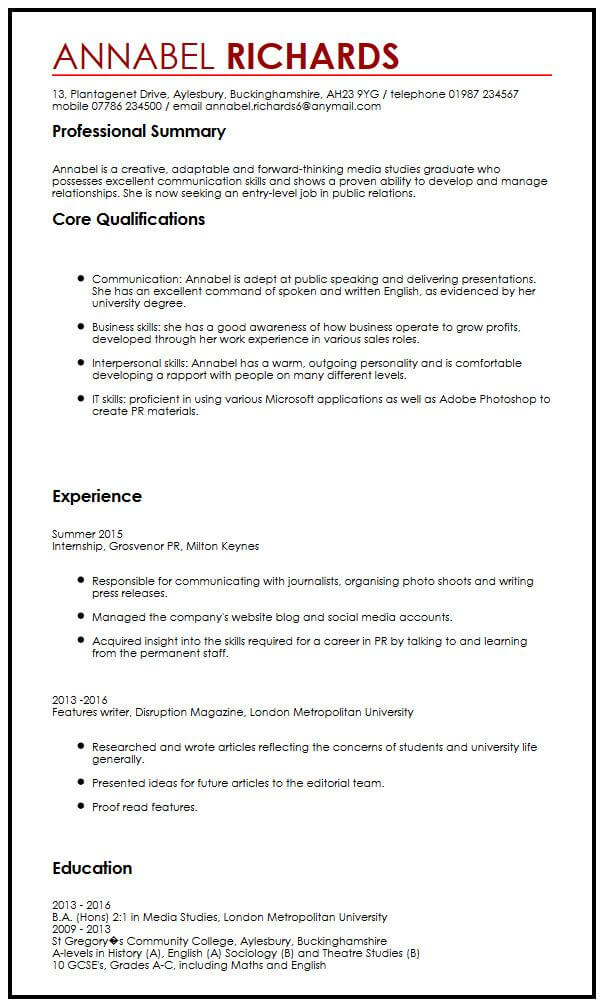How to write a good cv for university application
A CV or curriculum vitae is the first thing an employer will look at from your application.
How to Write Resume (Curriculum Vitae, CV) for Application to a University
It should reflect your education history, work experience, hobbies and interests. You can use our CV guide to write your own, then check it against the example in case you are in need of extra ideas. If you've finished your CV, check out our tips for perfecting your cover letter!
Your CV here vitae is the businesscard you give to the company where you how to write a good cv for university application going to apply, usually combined with your cover letter.
Your CV is a sum of short sentences that explain who you are, what you are capable of and what working experience you have. If you do not have any experience with making or delivering a cv, guidelines could be helpful.
CV Example | StudentJob UK
So, what exactly do you include in your CV? Your personal details are always on top of your CV.

At least state your name, address, phone number, e-mail address, marital status, nationality, date of birth and place of birth. How to write a good cv for how to write a good cv for university application application it is usual, at least, how to write a good cv for university application you are using it in a professional way, to add your LinkedIn and Twitter account. State all your relevant studies and courses that you have taken.
Start with the last study you were doing click all still link and work in a chronological way back.
5 Steps to an Awesome CV for your Master’s Application
Under the heading work experience will be the enumeration of jobs you have had. The same how to write a good cv for university application, start with the most recent job you have had and work your way back into history. State the name of the companies for which you have worked, the location, the job title you filled and a short job description.
Depending on the function you are applying how to write a good cv for university application, leave irrelevant jobs behind. In your CV, state what languages you speak and for every language indicate a level in writing and orally how to write a good cv for university application best lay out is as follows: Indicate what computer programs you control and how well you do it.

Think about software packages but specific systems as well. Lastly, state all issues read more think are important but have not shown up in your CV yet. Think about hobbies, interests and other relevant topics that say something about you. Do not forget to state your other activities, if you have done any administrative functions or voluntary work, you state this as well of course.
Example CVs
Use the last part of your CV to make it as personal as possible. Does your standard CV look great? Read how you can pimp it to a killer CV.
/essay-writing-service-birmingham.html it is about time to adjust your CV to the type of employee /essay-for-you-graduate-school.html position.
We give you fifteen tips to change your basic CV to a successful killer-CV. Place your contact details: Use a professional e-mail address: Photo, yes or no? Use hyperlinks in your text: Then fill in the URL of the site you want to link.
5 Steps to an Awesome CV for your Master’s Application -
Only include relevant working experience in your CV: An employer in the communication sector might not be interested that you have worked as a shelf stacker. Just spent more time on extra activities. Maybe you have worked for the school paper or you are very good at Photoshop?

Prayer in school essay help
When you apply to a university in the Netherlands, you are often required to provide a resume, or Curriculum Vitae, CV. It is a short autobiography where you tell to admission officers about yourself, your previous education, work and life experience, languages, and hobbies.

Best resume writing services dc canada day
Here is an example of a Chronological CV in which the information is arranged under general headings Education, Work Experience, etc. This is the most common format for current students and recent graduates. Here is an example of a skills-based CV in which all information is analysed for evidence of the most relevant skills for the job and then arranged under skills headings.

Essay help chat room tv
This section outlines key points to remember when preparing a CV and covering letter and highlights the different requirements for academic and non-academic CVs. When preparing any CV you should be targeting it to the job for which you are applying.
2018 ©